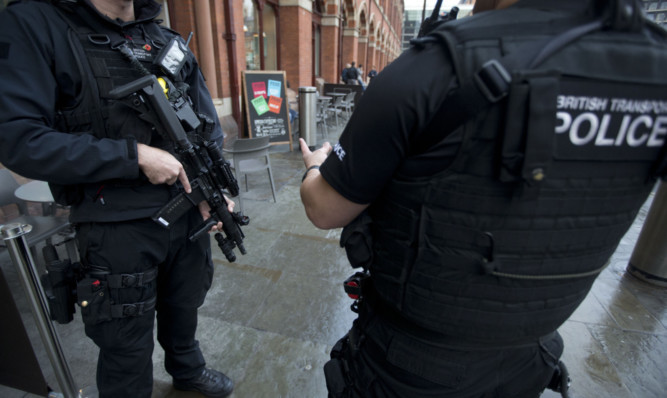Travelling on the London Underground in the run-up to Christmas is always a challenging experience.
There is jostling room only on platforms the nearer you get to the centre of town and on the trains, contact with strangers is too close for comfort.
However, in the wake of the recent terror attacks in Paris, there is an added dimension to being immersed in the relentlessly dense crowds.
An alleged machete assault by a suspected terrorist in Leytonstone, north London, on Saturday is a reminder, if we needed one, of the ever-present risks in this country.
I was on the Piccadilly Line earlier this week when a man hopped on at Green Park a little too late and the doors closed on his rucksack. Two passengers helped part the doors a fraction to pull him and his bag to safety and the Tube sped off.
Business as usual
It made me think, first, that Londoners are going about their business as usual, commuting, shopping, socialising and rubbing up against fellow travellers with no more concern than before.
Those who have lived in the city for a long time and put up with IRA atrocities are, if not blas, then watchful but undaunted by the heightened security threat. Younger generations tend to be undaunted full stop.
It is hard to imagine London, or any British city for that matter, ordering the total shutdown that jittery authorities in Brussels imposed on their residents two weeks ago.
However, Boris Johnson, the Mayor of London, said that it would be “irresponsible” to be complacent about the prospect of London being attacked and there is no denying that this fear is never far from people’s minds.
The rucksack man also made me think about rucksacks, the preferred luggage of suicide bombers and the means by which unsuspecting Britons were slaughtered on the Tube in July 2005.
There is no way the highly visible extra police strength deployed on the Underground could prevent a lone wolf murderer strolling in among the masses and wreaking havoc.
People are reassured by the sight of so many uniforms and the sound of sirens. They put up with the disruption of stations shutting, large chunks of the city cordoned off and unprecedented levels of police activity.
However, what is really keeping the capital safe is the unseen and unheard work going on behind the scenes.
Britain’s security services have foiled 40 terror plots since the 7/7 attacks, according to the Home Secretary, Theresa May.
In the last year alone, seven incidents have been prevented, including one in the past month, David Cameron revealed.
Some of these incidents have been well documented but many are known only to the intelligence community and to a handful of senior politicians.
In light of all this, the public would probably applaud every attempt by M15 to introduce further measures designed to protect them and would welcome Cameron’s suggestion that the investigatory powers bill going through parliament should be speeded up.
The new law, known as the “Snooper’s Charter” by its many detractors, will allow spies to hack into smartphones and computers.
The biggest overhaul of surveillance for 15 years, it would force internet and communications companies to retain customer usage data for up to a year and protect the ability of GCHQ and MI5 to collect data or hack into a suspect’s electronic devices.
Big Brother methods?
The Prime Minister has indicated that he now wants to implement the regulations earlier than 2017, as originally planned, yet critics claim it heralds in sinister Big Brother methods that invade individual privacy.
In an ideal world, where such niceties were a priority, I would agree with these defenders of our personal space. However, the world has never been more dangerous.
Just as it was necessary to take the fight to Isil by voting for RAF strikes against Syria, as most right-minded MPs agreed, it is essential we combat the enemy at home by arming our security experts with the weapon of intelligence.
Who cares if their Facebook pages are read by spooks, or if the mundane details of their mobile records are raked over by modern day George Smileys?
If such means of detection bring even one bomb maker to justice they are worthwhile.
In whose name do the civil libertarians think they speak when they try to block the work of our security operation?
Even prominent liberals, such as Lord Carlile, who until recently oversaw the UK’s terrorism legislation, has spoken out in favour of fast-tracking the surveillance bill.
When our way of life is in jeopardy and our freedom to move about our cities is overshadowed by an unpredictable menace, the right to small privacies has to take second place to the right to live.
All politicians of all parties must give those best placed to protect us every support they need.
